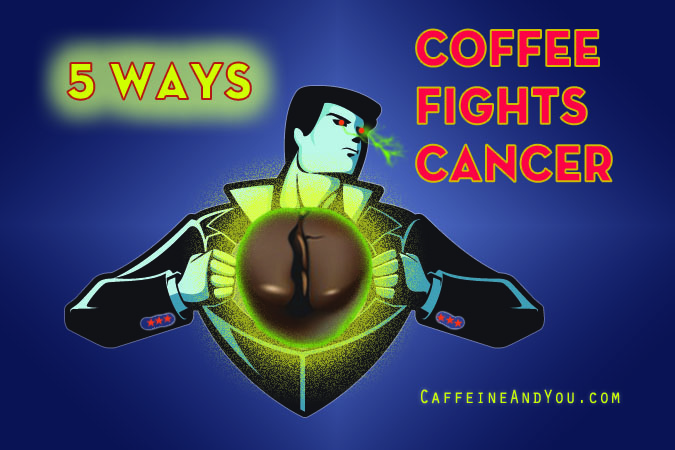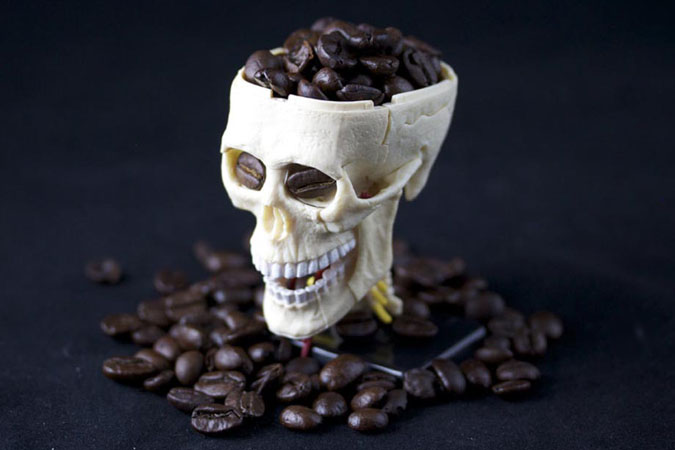Will coffee help keep you cancer-free? Possibly.
Coffee reduces the risk of certain cancers, according to the American Institute for Cancer Research. Of course, there’s no guarantee that a coffee habit will ensure a cancer-free life: cancers are complex and for that matter, coffee’s got its own mysteries. But mounting evidence suggests moderate coffee drinking may help reduce the risks of these cancers:
- Basal Cell Carcinoma (the most common form of skin cancer)
- Colorectal Cancer
- Prostate Cancer
- Kidney Cancer
- Liver Cancer
- Oral Cancer
What’s in coffee that prevents cancer?
Coffee’s considered a good scavenger of free radicals, because it’s rich in antioxidants and phytochemicals. Antioxidants neutralize chemicals (free radicals) that may damage body tissues. Phytochemicals are non-essential nutrients that plants develop for defense, protection, and disease-prevention. Phytochemicals include flavonoids, lignans and phenolic acid. Among the caffeine-rich foods we enjoy, tea and chocolate are rich with these compounds, but based on current research, coffee is the wealthiest.
5 Compounds in Coffee That Fight Cancer
Studies show that at least five compounds in coffee help reduce cancer risk:
Chlorogenic acid – This antioxidant compound is the major phenol in coffee. It’s technically an ester formed between quinic acid and caffeic acid. Caffeic acid is its main component; lab studies show it increases self-destruction of cancer cells and reduces inflammation. Chlorogenic acid’s antioxidants may be slightly lower in decaf and in instant coffee, but they’re still abundant. Quinic acid contributes to the acidic taste of coffee and is another phytochemical with antioxidant benefits.
Cafestol and kahweol – These fat-soluble compounds are extracted from coffee’s oils during brewing and are most available in unfiltered coffee (as in French press or boiled coffee; to drink more of these compounds, don’t use paper filters). Studies suggest kahweol and cafestol stimulate enzymes that neutralize carcinogens and block the proteins that activate carcinogens.
Caffeine – Everyone knows caffeine acts as a stimulant. It’s also a powerful antioxidant. Caffeine appears to reduce the risk for basal cell carcinoma (the most common form of skin cancer), though not for other skin cancers. Studies also show that caffeinated coffee, tea and soda reduce the risk; decaffeinated versions do not. Don’t stop applying sunscreen, experts advise, but caffeine appears to act like a sunscreen by directly absorbing damaging UV rays and blocking ATR, a protein activated by ultraviolet light.
Caffeine also reduces the risk of colorectal cancer risk. Researchers believe caffeine speeds carcinogens’ passage through the digestive tract, reducing exposure to these substances. Caffeine may also influence cell signaling to decrease colorectal cancer development.
NMB – N-methylpyridinium (NMB) appears to boost the potency of antioxidants, but it doesn’t occur with raw beans. It’s created during the roasting process, from trigonellin, its chemical precursor in raw coffee beans. NMB is present in both caffeinated and decaffeinated coffee, including instant.
Contrary to early studies, current research provides good evidence that moderate coffee drinking does not increase cancer risks in most people, and instead may reduce cancer risks.
Coffee Dosage for Cancer-Prevention
How much coffee does it take to get its cancer-fighting benefits? Each study varies in consumption. Some found benefits with as little as one to two cups a day, others averaged four cups, and none of the studies reported benefits when consumption exceeded six cups a day. (Six cups is considered a high dose, and risky for heart and other conditions.) Benefits didn’t happen overnight. Participants generally had a history of several years, if not decades, of daily coffee consumption. (Some research was replicated as lab and cell studies, others as human studies.)
Bottom line:
In the U.S., most coffee drinkers drink from one to three cups a day. If you enjoy coffee, you may be getting cancer-fighting benefits, as long as your daily habit stays within reason, and remains below six cups a day.
* * *
Further reading:
Foods That Fight Cancer: Coffee
Study: Coffee May Reduce Risk of Oral Cancer
Study: Coffee Consumption Reduces Risk of Oral Cancer
Highly Active Compound Found In Coffee May Prevent Colon Cancer
Coffee Consumption and the Risk of Cancers: An Overview
Coffee May Protect Against Skin Cancer
Coffee: Chemistry in Every Cup
Cancer Fighters: A Guide to Phytochemicals (American Institute for Cancer Research)


